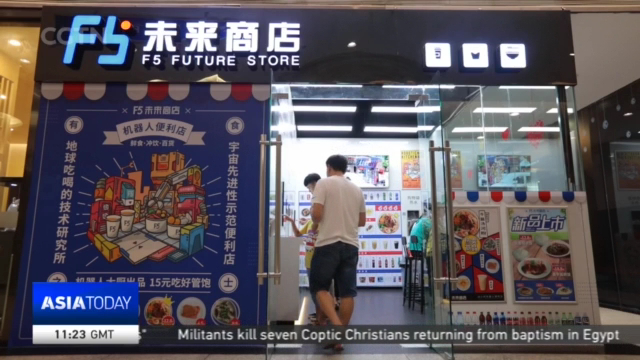
19:53, 03-Nov-2018
Living in the Future: Unmanned stores trending in China
Updated
19:47, 06-Nov-2018
03:54

China's first unmanned convenience store was launched back in October of 2014, two years before Amazon came up with the idea. Now the business model is trending and covers stores from supermarkets to bookshops. Zheng Yibing explores what the future of shopping looks like.
Imagine heading down to your local shop, getting everything you need, checking out and having done that without speaking to single soul. Well – we're going to do just that – getting breakfast at this unmanned convenience store.
ZHENG YIBING GUANGZHOU "The first thing is to place an order here just like what we do at other convenience stores, but here I want to choose something different."
This store looks like a huge machine. It is divided into three functioning areas. The first one, which can't be seen by customers, includes a massive fridge, an automated kitchen, and other commodity storage areas. The second part is an order and payment counter and goods delivery area. Once the fresh food is prepared, customers will receive their meal from a window, delivered by a robotic arm.
ZHENG YIBING GUANGZHOU "In less than three minutes, hot beef noodles can be served by the automated system."
CUSTOMER "If the unmanned technology can be applied in other convenient stores, it will be more attractive and convenient."
CUSTOMER "Cooking the food by robot is safer and is environment-friendly. I think the food is delicious as well. It's worth setting up around other parts of the country."
Yet, the entire automated system is not what's special about these stores. Those behind the technology are trying to give it a more personal feel that's customizable menus through facial recognition.
LIN XIAOLONG CO-FOUNDER, F5 FUTURE STORE "In two seconds, it can recognize me and joke with me. The computer will collect all of my consumption data and personalize my menu. In fact, the machine knows me better than I know myself."
As the cost of human resources continues to grow, this new business model is helping cut down costs.
LIN XIAOLONG CO-FOUNDER, F5 FUTURE STORE "In this case, an assistant can take care of two stores. But in normal convenience stores, at least seven shop keepers are required to run it. In terms of energy consumption, it can be 67 to 75 percent more efficient than a traditional store, because an unmanned store doesn't have costs associated with heating."
ZHENG YIBING GUANGZHOU "After the meal, I decide to do some shopping. Now, I find myself in a bookstore, where there are no salespeople."
By scanning the QR code and registering through my mobile phone, a blue light shines bright, meaning I can enter the bookstore.
FANG HAO, CHIEF OPERATING OFFICER IFANX BOOKSHOP "Many people are busy with work, and it is really hard to find a quiet place to do some reading. This unmanned bookstore offers people a suitable place to enjoy reading."
After choosing a book, I need to stand in the payment area and scan a QR code one more time.
ZHENG YIBING GUANGZHOU "Technology continues to shape our world. And unmanned technology brings people not only more conveniences, but also more options to free our hands from hard labour, and seek out more creative jobs."
The transaction volume of unmanned retail stores in China hit 38 billion yuan in 2017. That's expected to exceed 1.8 trillion yuan in 2022.
As Lin and Fang say, the intersection of human labor and AI technology will redefine traditional jobs and tasks. Automated processes and new technology, in their view, have the potential to help finish the job in a more creative and efficient manner. Zheng Yibing, CGTN, Guangzhou, in Guangdong Province.

SITEMAP
Copyright © 2018 CGTN. Beijing ICP prepared NO.16065310-3
Copyright © 2018 CGTN. Beijing ICP prepared NO.16065310-3